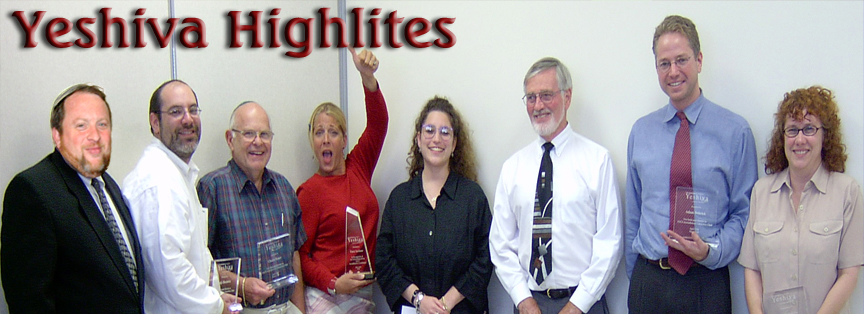The school's commemoration of
Yom
Hashoah began with the reading of names
of victims in a pitch black room and ended with a
Keil
maleh rachamim and with each student lighting a
memorial candle. In between, the students and
faculty
viewed
the movie Paperclips, a recently released
Holocaust-
related documentary. This film, however, was far
different than the ones which we have seen in the
past.
The movie told the story of students from the
Whitwell Middle School, a public school in
predominantly
Caucasian, Protestant rural
Tennessee, who decided to do a project that
would sensitize the students to people who are
different from them. They chose to study the
Holocaust. Early in these studies, the students asked
their teachers for a way to understand the enormity
of the number 6,000,000.
It began as a simple project collecting paperclips to
represent each victim of Hitler's genocide.
This inspiring venture grew into a remarkable and
unforgettable lesson that changed the lives of the
entire Whitwell community and the millions of people
throughout the world who have learned about it.
Through their tireless efforts, passion, and
commitment, these students and their teachers
broke the boundaries of race and religion which Hitler
drew. They were able to far surpass their goal, and
now, with twenty-nine million paperclips, have
established a permanent memorial.
After watching the film, the
writer and director
Joe Fab spoke to us in a question-answer
session as a follow up. His dedication to the project,
as an artist who is not Jewish, is inspiring.
On a personal level, I found this film extremely
moving. To have a large group of middle school
students voluntarily devote their time, energy and
strength to a cause with which they have no
attachment is remarkable. However, what struck me
most was that
something as small and
insignificant as a paperclip could impact so many
lives from so many different backgrounds.
Furthermore, the movie's purpose was not to only
recognize the intolerance done to the Jews, but to
everyone brutally subjected in the Holocaust due to
prejudice.
Throughout the film, one could see the town's
people slowly being affected and becoming more
open minded. For example, the assistant principal
confessed to having stereotypical views on those in
the north before starting the project. Once the task
began, his entire mindset was transformed. The idea
that this project could change a whole people's
attitude towards others is tremendous. A society
without bigotry is hard to imagine. However, this
movie gives its viewers
faith that the world can
change, one person at a time.
Thank you to
Mr. Ronald and Mrs. Sarah
Gottleib
(parents of Nechama '03) who sponsored the
program in memory of their fathers, Rabbi Nathan
Gottleib and Mr. Jack Warsawiak.


